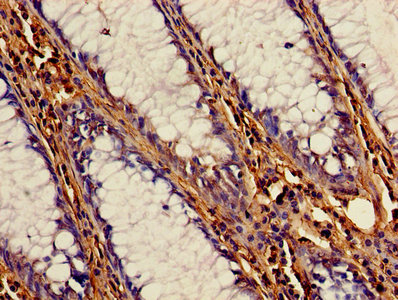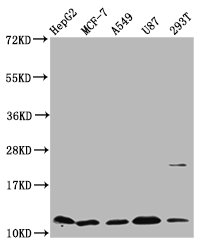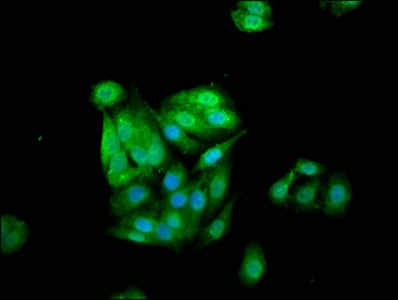-
货号:CSB-PA00224A0Rb
-
规格:¥440
-
促销:
-
图片:
-
Immunohistochemistry of paraffin-embedded human colon cancer using CSB-PA00224A0Rb at dilution of 1:100
-
IHC image of CSB-PA00224A0Rb diluted at 1:400 and staining in paraffin-embedded human lung cancer performed on a Leica BondTM system. After dewaxing and hydration, antigen retrieval was mediated by high pressure in a citrate buffer (pH 6.0). Section was blocked with 10% normal goat serum 30min at RT. Then primary antibody (1% BSA) was incubated at 4°C overnight. The primary is detected by a biotinylated secondary antibody and visualized using an HRP conjugated SP system.
-
Western Blot
Positive WB detected in: HepG2 whole cell lysate, MCF-7 whole cell lysate, A549 whole cell lysate, U87 whole cell lysate, 293T whole cell lysate
All lanes: CSTB antibody at 5.36µg/ml
Secondary
Goat polyclonal to rabbit IgG at 1/50000 dilution
Predicted band size: 12 kDa
Observed band size: 12 kDa -
Immunofluorescence staining of HepG2 cells with CSB-PA00224A0Rb at 1:133, counter-stained with DAPI. The cells were fixed in 4% formaldehyde, permeabilized using 0.2% Triton X-100 and blocked in 10% normal Goat Serum. The cells were then incubated with the antibody overnight at 4°C. The secondary antibody was Alexa Fluor 488-congugated AffiniPure Goat Anti-Rabbit IgG(H+L).
-
Immunoprecipitating CSTB in HepG2 whole cell lysate
Lane 1: Rabbit control IgG instead of CSB-PA00224A0Rb in HepG2 whole cell lysate. For western blotting, a HRP-conjugated Protein G antibody was used as the secondary antibody (1/2000)
Lane 2: CSB-PA00224A0Rb (6µg) + HepG2 whole cell lysate (500µg)
Lane 3: HepG2 whole cell lysate (20µg)
-
-
其他:
产品详情
-
产品描述:
The CSTB polyclonal antibody is produced in rabbits using recombinant human CSTB (1-98aa) as an immunogen. This antibody can be used to detect CSTB protein in human samples. The antibody has been purified using Protein G, reaching up to 95% in purity.
The CSTB antibody can be used to study the function and regulation of CSTB protein in a variety of applications, including ELISA, WB, IHC, IF, and IP. In ELISA, this CSTB antibody can be used to quantitatively detect CSTB protein in a sample. In WB, it can be used to detect the presence of CSTB protein in a sample and determine its size. In IHC, this CSTB antibody can be used to detect the localization and expression levels of CSTB protein in tissues. In IF, this CSTB antibody can be used to detect the presence and localization of CSTB protein in cells. In IP, this antibody can be used to isolate and purify CSTB protein from a complex mixture of proteins.
-
产品名称:Rabbit anti-Homo sapiens (Human) CSTB Polyclonal antibody
-
Uniprot No.:P04080
-
基因名:CSTB
-
别名:CHROW21 antibody; CPI B antibody; CPI-B antibody; CST 6 antibody; CST6 antibody; CSTB antibody; Cystatin B (stefin B) antibody; Cystatin B antibody; Cystatin-B antibody; CYTB antibody; CYTB_HUMAN antibody; EPM1 antibody; EPM1A antibody; Liver thiol proteinase inhibitor antibody; PME antibody; Stefin-B antibody; STF B antibody; STFB antibody; ULD antibody
-
宿主:Rabbit
-
反应种属:Human
-
免疫原:Recombinant Human Cystatin-B protein (1-98AA)
-
免疫原种属:Homo sapiens (Human)
-
标记方式:Non-conjugated
本页面中的产品,CSTB Antibody (CSB-PA00224A0Rb),的标记方式是Non-conjugated。对于CSTB Antibody,我们还提供其他标记。见下表:
-
克隆类型:Polyclonal
-
抗体亚型:IgG
-
纯化方式:>95%, Protein G purified
-
浓度:It differs from different batches. Please contact us to confirm it.
-
保存缓冲液:Preservative: 0.03% Proclin 300
Constituents: 50% Glycerol, 0.01M PBS, PH 7.4 -
产品提供形式:Liquid
-
应用范围:ELISA, WB, IHC, IF, IP
-
推荐稀释比:
Application Recommended Dilution WB 1:1000-1:5000 IHC 1:100-1:500 IF 1:50-1:200 IP 1:200-1:2000 -
Protocols:
-
储存条件:Upon receipt, store at -20°C or -80°C. Avoid repeated freeze.
-
货期:Basically, we can dispatch the products out in 1-3 working days after receiving your orders. Delivery time maybe differs from different purchasing way or location, please kindly consult your local distributors for specific delivery time.
引用文献
- Uterine Insulin Sensitivity Defects Induced Embryo Implantation Loss Associated with Mitochondrial Dysfunction-Triggered Oxidative Stress Meixia Chen,Oxidative medicine and cellular longevity,2021
相关产品
靶点详情
-
功能:This is an intracellular thiol proteinase inhibitor. Tightly binding reversible inhibitor of cathepsins L, H and B.
-
基因功能参考文献:
- cystatin B expression was significantly and inversely correlated with lung tumor stage and tumor grade PMID: 29037838
- The results demonstrate that cystatin B interferes with the STAT-1 signaling and IFN-beta-antiviral responses perpetuating HIV in macrophage reservoirs. PMID: 27137788
- apoptosis is accompanied by degradation of the cysteine cathepsin inhibitor stefin B (StfB). CatD did not exhibit a crucial role in this step. However, this degradation was partially prevented through pre-incubation with the antioxidant N-acetyl cysteine PMID: 28543404
- Homozygous for a c.218dupT (p.His75Serfs*2) mutation in exon 3 of CSTB causes neurodegeneration, progressive cerebral volume loss and diffuse hypomyelination. PMID: 28378817
- CSTB downregulation may promote the development of gastric cancer. PMID: 28281969
- It was shown that decreased expression of cystatin B enhances cathepsin activity in Niemann-Pick C cerebellar degeneration patient fibroblasts. PMID: 26908626
- High expression of stefin B may be an important factor contributing to the development and metastasis of Hepatocellular Carcinoma. PMID: 26753874
- CSTB null mutation associated with microcephaly, early developmental delay, and severe dyskinesia. PMID: 26843564
- Data shows that CYTB and ANXA4 overexpression may be involved in carcinogenesis and histopathological differentiation of ovarian clear cell carcinoma and suggest they may serve as a potential diagnostic biomarkers. PMID: 25633807
- A role for disease-causing mutations in cystatin B gene in patients with juvenile myoclonic epilepsy was not supported. PMID: 25752200
- Even though the majority of EPM1 patients have a uniform genetic mutation, the actual size of the longer CSTB expansion mutation allele is likely to have a modulating effect on the age at disease onset, myoclonus severity, and cortical neurophysiology. PMID: 25770194
- The study shows detection of stefin B dimers in HEK293 cells and the importance of their residual activity. PMID: 25047918
- glutamate dehydrogenase is a euchromatin-associated enzyme, and its H3 clipping activity is regulated by chromatin structure, histone modifications and an in vivo inhibitor. PMID: 25263734
- detected a homozygous expansion of dodecamer repeats in the CSTB gene in four patients with clinical diagnosis of ULD. PMID: 23883076
- The increased CSTB expression in ovarian tissue represents tumor progression and is dysregulated by the TGF-beta signaling pathway. PMID: 24452274
- A reciprocal influence of CSTB and SOD1 at the gene expression level and for a direct interaction of the two proteins, is reported. PMID: 24234043
- The present study was performed on two more missense mutants of human stefin B, G50E and Q71P, and they similarly showed numerous aggregates upon overexpression. PMID: 24909779
- The co-localization of stefin B wild type and EPM1 mutants with cathepsins showed that cathepsins accumulate around the aggregates formed by the EPM1 mutants. PMID: 23362198
- Skull thickening and an increased prevalence of abnormal findings in skeletal radiographs of patients with EPM1 suggest that this condition is connected to defective cystatin B function. PMID: 23010349
- This study suggested that CSTB mutations other than the common dodecamer expansion predict particular phenotypes, including marked seizure severity and polymorphous seizure types. PMID: 23205931
- Elevated StefA mRNA level is associated with invasive glioblastoma. PMID: 22287159
- S-glutathionylation and S-cysteinylation were described as extensive PTM of a salivary protein and the first time that these PTMs were detected in naturally occurring cystatin B. PMID: 22057043
- patients compound heterozygous for the dodecamer repeat expansion and the c.202C>T mutations seem to have a severer form of Unverricht-Lundborg disease (EPM1) than patients homozygous for the expansion mutation PMID: 21757863
- At pH 7.0 the mutant H75W folded in three kinetic phases to a native-like intermediate, analogous to folding of stefin B at pH 4.8. PMID: 22033403
- Intracellular stefin b aggregation shows a negative correlation with cell survival PMID: 20078424
- Stefin B interacts with histones and cathepsin L in the nucleus PMID: 20075068
- oligomers of stefin B and amyloid-beta interact in vitro and in cells PMID: 19955183
- Oligonucleotides containing EPM1 repeat adopt secondary structures that may facilitate strand slippage thereby causing the expansion. PMID: 11697734
- Intramolecular i-motif structure at acidic pH for progressive myoclonus epilepsy (EPM1) repeat d(CCCCGCCCCGCG)n. PMID: 11697735
- analysed eight markers flanking CSTB(GT10-D21S1890-D21S1885-D21S2040-D21S1259- CSTB-D21S1912-PFKL-D21S171) and one intragenic variant in the CSTB 3' UTR (A2575G) PMID: 12215838
- first demonstration of cysteine protease activity being regulated by CSTB activity in a biological context; effects of decreased CSTB activity in EPM1 pathogenesis may be mediated by cathepsins through increased activity of cathepsins S and L PMID: 12452481
- Prefibrillar oligomers/aggregates of stefin B also increase the surface pressure at an air-water interface, i.e. they have amphipathic character and are surface seeking. PMID: 15955063
- These data show that cystatin B inhibits bone resorption by down-regulating intracellular cathepsin K activity despite increased osteoclast survival. PMID: 16321512
- Study shows that copper binding by stefin B inhibits the amyloid fibril formation and, to a lesser degree, the initial aggregation. PMID: 16939620
- Several alternatively spliced CSTB isoforms were identified in patients with progressive myoclonus epilepsy of Unverricht-Lundborg type . PMID: 17003839
- Results describe the influence of pH and trifluoroethanol on amyloid fibril growth and morphology from human stefin B. PMID: 17701471
- cystatin B in vivo has a polymeric structure sensitive to the redox environment and that overexpression of the protein generates aggregates. PMID: 17920138
- CSTB is specifically overexpressed in most HCCs and is also elevated in the serum of a large proportion of HCC patients PMID: 18281540
- Data show that wild-type stefin B and its Y31 isoform are able to form pores in planar lipid bilayers, whereas the G4R isoform destroys the bilayer by a non pore-forming process. PMID: 18397316
- The mechanism of amyloid-fibril formation by stefin B: temperature and protein concentration dependence of the rates;the observed kinetics follow the nucleation and growth behavior observed for many other amyloidogenic proteins. PMID: 18636508
- potential role for CSTB in HIV replication in placental macrophages PMID: 18951626
- cystatin B interacts with STAT-1 and the levels of STAT-1 tyrosine phosphorylation (but not serine phosphorylation) between uninfected and HIV-infected PM and MDM are differentially regulated. PMID: 19342095
显示更多
收起更多
-
相关疾病:Epilepsy, progressive myoclonic 1 (EPM1)
-
亚细胞定位:Cytoplasm. Nucleus.
-
蛋白家族:Cystatin family
-
数据库链接:
HGNC: 2482
OMIM: 254800
KEGG: hsa:1476
STRING: 9606.ENSP00000291568
UniGene: Hs.695
Most popular with customers
-
-
YWHAB Recombinant Monoclonal Antibody
Applications: ELISA, WB, IF, FC
Species Reactivity: Human, Mouse, Rat
-
-
-
-
-
-


























